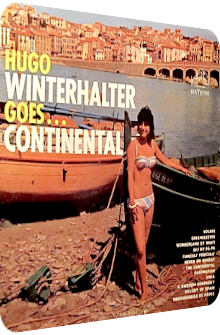
Hugo Winterhalter
Goes… Continental
1962
Goes… Continental is part of composer and arranger Hugo Winterhalter’s (1909–1973) famous series of aural travelogs all around the world. Released on RCA Victor in 1962, spanning 12 tracks – one of them unique –, several countries and a large as well as varied orchestra, the (almost) completely instrumental album merges the string washes and harpsichord jitters of the Space-Age era with the pompous brass infusions and castanet grooves of Latin origin and garnishes this amalgamation with the quirky flutes of the Exotica genre. Travelogs are certainly Exotica’s greatest achievement, and one can indeed argue whether this concept encapsulates the true spirit of Exotica, with its many birds, percussion strata and instruments functioning as mere gimmicks rather than being the genre’s mandatory cores. Be that as it may, travelogs are featured few and far between here at AmbientExotica and are eminently versatile style-wise. It is, in retrospect, surprising how different the approaches of the respective arranger are.
Jackie Gleason’s Music Around The World (1966), for instance, is a smoochy effort and streamlines the various destinations, moulding them into an exclusively romantic setting until all distinctive elements are lost and the listener does not know anymore in which country he or she is situated in at any given moment. Warren Barker’s A Musical Touch Of Far Away Places (1959) meanwhile specializes on the Far East and is realized with the help of movie star William Holden’s private collection of exotic instruments, whereas Irv Cottler’s Around The World In Percussion (1961) merges the drummer’s skills with orchestral movements, and these works are but three LP’s amid a magnitude of related records. So how does Hugo Winterhalter’s Goes… Continental fare? I will tell you below, and blimey, the first visit looks quite girlish!
The initial stop of Hugo Winterhalter’s journey leads him to the first girl (of two in total) whose facial features are well known and have been interpreted several times in the history of Space-Age: Anna. Envisioned by Roman Vatro and also known as El Negro Zumbon, the American arranger studies the luminous figure and transforms the glowing scenery into music via multitudinous iridescent percussion instruments, among them triangles and tambourins. Their prominent pitch gyres around the sun-kissed nine-tone melody that many listeners are still encountering anew day by day, even if it is played on a cheeky nylon string guitar in The Avalanches’ turbulent award-winning Frontier Psychiatrist off Since I Left You (2000). Winterhalter’s second column in adjacency to the plinking percussion is based on silkened string washes, a pointillistic slap bass and a celesta that could have been taken right out of the beach at Rimini. Gleeful but not horribly chintzy, it makes for a great start and is one of my favorite renditions in a long list of Anna-isms.
Melody Of Spain is next, the one and only unique track by the presenter himself. Castanets? Check! Accordions? ¡Sí, claro! Oscillating between the dribbling schmaltzscapades of Bert Kaempfert and clever rhythm-and-style shifts, Winterhalter’s bucolic vista turns into a Tango without letting the mandatory nocturnal feeling in.
Hugo Alfvén’s A Swedish Rhapsody is then treated in an interesting way as well, although the integrated textures are awkwardly de trop, I think. The lead accordion would be too syrupy even for The Three Suns, and to make matters worse, the high strings and their sweeping glissando is too convivial for my taste. There are two valuable features, however: the Rock-influenced percussion pattern is quite catchy and only waits for Gospel-like handclaps, with the harpsichord offering a nice surface in the song’s second phase that somewhat contradicts the scenery by almost breaking the third wall. Dick Manning’s Fascination follows, the ballad that made Pat Boone famous in even more parts of the world. And say what you will, but the arrangement works. Hopelessly harbored in romance, comprising of a downbeat structure supercharged with accordions and mauve-tinted strings, this should lead to a cheesy ballad, but the Space-Age strings and their warped wonkiness work fantastically well in tandem with the cautiously reverberated accordion. The arrangement might not sport one’s favorite lineup of instruments, but it is indeed inherently consistent without any unnecessary adjuvant.
Whereas Klaus Günter Neumann’s and Lincoln Chase’s Wonderland By Night blasts the listener to faraway lands via its majestic kick-off phase full of brass fanfares which then lead to a horn-string gallimaufry that is held together by a rhythm guitar, the traditional Funiculi Funicula is the interim stopover, marking the end of side A. Sporting a warbled fife, a counteracting murky trombone and a 6/8 rhythm with brass stabs and Sicilian lutes par excellence, this piece o’ Italy is again cohesive enough to not be put down. Its wideness is genuinely impressive. And what a surprise, a choir is also on board. Just wait for the final three (!) seconds.
Side B offers another six destinations and encounters in continental countries. Astutely enough, The Continental is their gateway. Written by Con Conrad and Herbert Magidson as a prominent part of the 1934 musical The Gay Divorcee, Winterhalter surprises yet again with an interesting rhythm thicket of muffled hi-hats and clinging tambourins. He furthermore rounds the soundscape off with a nice dose of magenta harpsichords scything next to the string washes and sky-high flutes. Space-Age par excellence, with strong rhythms but less luminous harmonies. Greensleeves is next, a moment where the whole LP would jump the shark if it were a true-spirited concept album. This traditional Christmas song not only throws the listening subject into a frosty landscape with heavily doleful strings and saddened trumpets, it is also horribly incongruous in the given endemics. It is as if the arranger wants to leave Easy Listening behind for a short moment. He succeeds… and that is why he ultimately fails.
Moving along to warmer climes, Paul Burkhard’s Oh! My Pa-Pa gets the full string treatment with cavalcades of violins and cellos; the second part is problematic, resembling Geoff Love’s Easy Listening orchestra Manuel And The Music Of The Mountains qua the overly piercing and brazen lead trumpet. Another letdown in the end, but Billy Towne’s and Manos Hadjidakis’s classic Never On Sunday brings the album back on track, finally! A fast upbeat interpretation full of harpsichords, accordions, flutes, strings and a pompous percussion placenta that seems larger than it actually is due to clever hall effects, Winterhalter showcases all instruments he can get hold of. The melodies shine as well, making this the pinnacle of side B.
Whereas Mademoiselle De Paree by Eric Maschwitz, Henri Contet and Paul Durand marks the second appearance of a woman and is equally enchanting and consistent like side A’s Fascination due to its Waltz-like warmth and enthralling mixture of Space-Age strings, accordions and their various interstices, the finale features Volare. Yes, you got that right. Envisioned by Domenico Modugno, Francesci Migliacci and Mitchell Parish in 1958, the song was the latest rad back then and is indeed one of the best renditions I know of. The main melody is played on a harpsichord and backed by pizzicato strings and their legato brethren as well as a screeching flute. This prevents the transmutation from becoming stale and all too common. A great closure even to those listeners who otherwise despise the omnipresence of Volare. I know I do. And am spellbound regardless.
When Hugo Winterhalter Goes Continental, you better go with him, as the arrangements are delicately multifaceted, sporting many sinews and instruments while retaining the focus without making this a brummagem release that features completely divergent setups. Divergence is still key to Winterhalter’s way of arranging things, but not exclusively for the better: the setups may not be divergent, true, but the settings are. What seems like a state everyone wishes for in Exotica albums – illustrious locations flashing by time and again – becomes more of a problem in a coherent context, otherwise simply known as the album format. The missteps Winterhalter can be accused of are indeed horrible from an aesthetic viewpoint. The two renditions I am talking about are the traditional Greensleeves and Oh! My Papa. While the former breaks the mood and feels like a glacial leftover of another album, artist and time, the latter is too focused on a piercing trumpet which destroys the otherwise carefully adjusted first half of the arrangement.
This twofold faux pas aside, the album rocks and outweighs its lesser parts by far! The strings are occasionally smarmy, but the focus on Space-Age washes and lack of pizzicato blebs – at least most of the time – make Goes… Continental so fantastic. Even the accordions do add that certain something to the sceneries, with the pre-Funk harpsichord being a galactic-burlesque scapegrace. Vivacious highlights include Never On Sunday, Volare (believe it or not!) and yes, even Funiculi Funicula. Truly bedazzling highlights, however, are the two downbeat ballads Mademoiselle De Paree and Fascination. They break the flow as well, but cannot be blamed at all, as they are so enormously languorous, captivating and dreamy that they are among my Space-Age favorites. Hugo Winterhalter’s Goes… Continental is available on vinyl and a remastered digital version.
Exotica Review 345: Hugo Winterhalter – Goes… Continental (1962). Originally published on May 31, 2014 at AmbientExotica.com.
